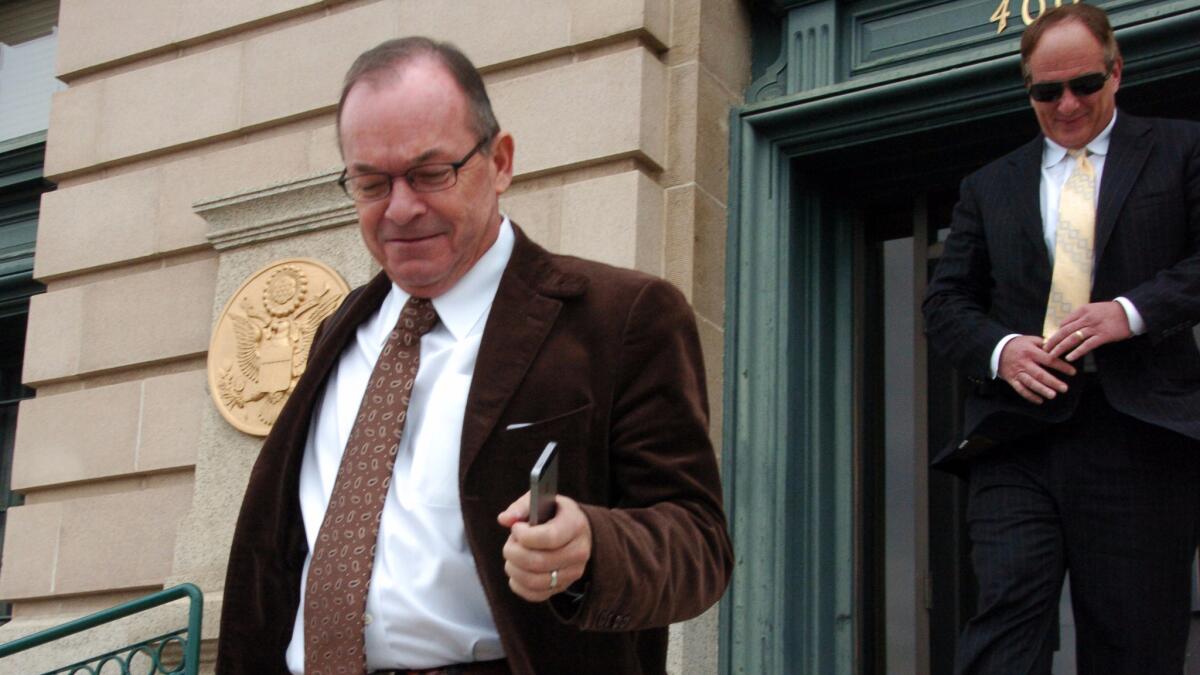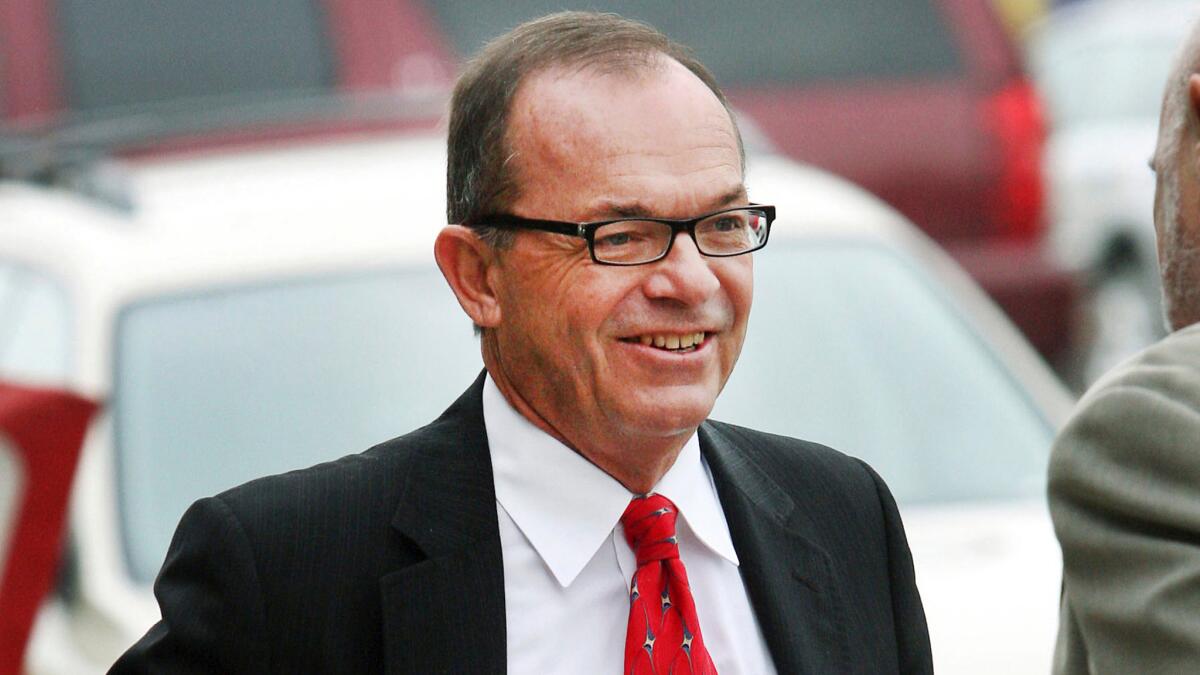Billionaire who went bust is out of jail and still owes millions. Many are watching his next move

- Share via
Reporting from Seattle — Tim Blixseth grew up poor in Oregon, eating Spam five times a week, he recalls.
He went on to become a millionaire Northwest timber baron, then ended up in bankruptcy, $15 million in debt.
But he came roaring back with more timber deals, becoming a millionaire again, then turned to real estate, and became a billionaire – only to once again wind up in bankruptcy.
In large part he blamed the 2008 mortgage collapse for undermining his biggest project, a Montana resort whose failure would eventually send him to jail last year on civil contempt charges.
It was rock bottom, it seemed, for the man who had been one of America’s richest - worth $1.3 billion in 2006, according to Forbes - and traveled the West in his Rolls-Royce and private jet.
In the last decade, when not being sued, Blixseth sued others, including Edra Crocker, his former wife. In one case, he sought $6 billion in damages, contending that Crocker and others had participated in a racketeering conspiracy against him. Crocker, though, claimed it was Blixseth who had “looted the companies and taken the cash.” Blixseth also sued one of his attorneys who he alleged had conspired against him, and filed a $9-billion suit against a bankruptcy trustee. The efforts failed.

He quietly celebrated his 65th and 66th birthdays behind bars, topped off by a visit from a courier bearing divorce papers from his third wife, Jessica Blixseth, 44.
Crocker, his second wife, had made their 2008 divorce memorable too, throwing a $90,000 freedom party and handing out toilet paper with Blixseth’s face printed on it.
But after 14 months, he was released this month from jail in Great Falls, Mont., having complained to a federal appeals court that he was being treated like a criminal.
Besides, he argued successfully, the civil issue he was jailed for – what he did with assets from the sale of another resort, in Mexico – had been settled.
A free man, he now has creditors, attorneys and those who have followed his career wondering whether he’ll make yet another comeback. Will his rags-to-riches-to-rags saga once more end in riches?
Some of his foes probably hope so. He still owes millions. And he won’t reveal, exactly, what he’s worth.
Blixseth – who was also a songwriter and record producer with a Grammy nomination and once had homes in Palm Springs and a Seattle suburb where Bill Gates was his neighbor – didn’t respond to recent interview requests.
He did tell a Montana reporter before departing that he needed some sun and a bed not made out of iron.
“We do not know where Tim resides,” says Kevin Barrett, one of the many attorneys on a trail of assets Blixseth is believed to have hidden. “We do know that he signed a declaration a few days ago in Palm Desert. It was filed in the [Montana resort] bankruptcy case.”
Barrett’s West Virginia firm, working as a trustee in the case, advertised a bounty of 10% of the findings to anyone who might know of any assets.
“The bounty spawned a lot of responses,” Barrett says, “but did not result in any particularly useful information.”
Lawsuits and mortgage failures resulting from the resort fiasco steadily ate away Blixseth’s fortune, according to court documents. The Yellowstone Club, near the national park, was planned for multimillion-dollar chalets set around a $100-million lodge.
Investors and members included Gates, former Vice President Dan Quayle, and Tour de France winner Greg LeMond, who won a $41-million judgment by alleging Blixseth had cheated him. The club, now owned by new developers, survives today as the “world’s only private ski and golf community.”
Blixseth became a nearly full-time defendant trying to settle resort, bankruptcy and other legal issues. A hold was put on his assets by the court in the Yellowstone case, but he was accused of diverting and hiding $13 million during that period from the sale of the Mexican resort he owned.
“Mr. Blixseth is broke,” one of his attorneys told a federal judge in 2014. Blixseth owed him money, as well, the attorney added.
Courts have not reacted kindly. Blixseth and his business entities used “scorched-earth [and] unprofessional litigation tactics,” they have ruled. He also demonstrated a “pattern of sanctionable behavior” and “elected to use every procedural mechanism of our legal system to evade … contractual obligations, obfuscate, manufacture disputes, and leverage its business position in a duplicitous manner.”
The Montana judge in the pivotal resort case did not seem happy with Blixseth either. His attorney suggested the resentment was misplaced. In court papers, the attorney, Becky James of Los Angeles, said the trustees had agreed in early 2015 that “Blixseth finally provided enough documentation to allow the Court and the Trust to determine with some clarity how he dissipated the proceeds of the illicit sale” of the Mexico resort.
Trustees said in their own filing that the documents seemed to sufficiently account for all the questioned funds and agreed it was time to move on from that dispute. But the court said it still wasn’t satisfied that Blixseth had demonstrated he was as broke as he claimed to be.
“I’m as imperfect as the next guy,” he wrote on his Web page, “but I’ve tried my best to live by certain core values my whole life,” including working hard, seeking justice for all and not letting one being defined by one’s possessions. “Let your character define you,” he wrote, “not your things.”
Anderson is a special correspondent
ALSO
Former federal agent sentenced to prison in sex-slave bribery case
Yahoo sale’s added plus for Verizon: Silicon Valley real estate
Missing finger, car license plate help convict ‘Cowboy Gun Bandits’ in federal case
More to Read
Sign up for Essential California
The most important California stories and recommendations in your inbox every morning.
You may occasionally receive promotional content from the Los Angeles Times.









